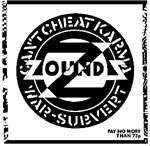Shop Around 13

Naturally those selections say more about Mulholland, and his stance on pop. Thatís fair enough. He understandably wants to delight and provoke. I might split hairs, and say thereís no Vic Godard or Subway Sect (check out the new Singles Anthology to see whatís missing!) or no A Man Called Adam or no Photek. But would be splitting hairs. Any book that collects together Scars, Womack and Womack, Gang Starr, Kelis and the Delta 5 is fine by me.
Itís just that at times you cry out for a jarring, more daring note. For example, the Delta 5ís 'Mind Your Own Business' entry is accompanied by the bold statement that at the time of its release Rough Trade was the bravest and best pop label around. Yup, we agree with that. But thinking about all the great singles Rough Trade released you almost want to be as brave, and argue that the best single Rough Trade released in its heyday was 'Demystification' by Zounds.
Anyone remember Zounds? They were one of those outfits associated with the Crass organisation. And thatís enough to send those of us who were into clean living under difficult circumstances run for the hills. Crass, the circle a groups, the anarcho-squatters scene ≠ for many of us this equated to nasty neo-hippydom. For some reason that leaves an impression of hectoring, expectorant vocals, speeded up blank metal riffs, and free stencils.
Strangely Zounds were an ultra-pop outfit, who created gorgeous melodic conscious punk gems along the lines of the Buzzcocks, Adverts, and Alternative TV. In fairness they were closer to the Here and Now/Gong happy end of the squat-DIY-punk scene, and shared a melodic intent with others like The Mob, Flux of Pink Indians, Blyth Power which was in sharp contrast to the higher profile row of Crass/Discharge etc. In fact Zounds sound closer to the Jasmine Minks than they do to the hardcore uproar.
After one EP for Crass, Zounds fell in with Rough Trade in the early Ď80s, and there with the in-house pop alchemist Adam Kidron at the controls they produced the classic single 'Demystification' single and The Curse of Zounds LP. This would have been at a time when Kidron was moving the underground towards the new pop promised land, so it is perhaps for that reason the set sounds so un-rock heavy. Itís quite likely the recordings were a minor distraction for Kidron compared to his work with Scritti Politti or Orange Juice. Regardless, the end result was pop/punk perfection, with lots of neat embellishments, ultra-catchy hooks, and biting observations. The centrepiece is the epic 'Did He Jump' suite, which features a contribution from Gina Birch.
For the follow-up single Rough Trade got Mikey Dread in to produce, which on paper sounds wonderful. While anyone expecting another 'Bankrobber' would be rather disappointed, the 'Dancing'/'True Love' pairing is an understated pop classic, heavy on atmospherics. The final Rough Trade single 'More Trouble'/'Knife' is back to the sort of trebly, spikey pop perfection which is more synonymous with Irish Good Vibrations releases from the likes of Rudi, Outcasts and Protex than Crass associates. But prejudices are a funny thing.
Zounds for all I know could be the ultimate cult group with a dedicated following of thousands. Iíd like to think so. Their recordings have worn remarkably well. And if you donít believe me seek out a copy of The Curse of Zounds plus Singles CD on the American Broken Rekids label. If you shop around youíll find one nice and cheap, and will never regret it. While their brand of melodic punk/pop may be big business nowadays, their astute observations on everyday life and personal politics are in desperately short measure.
© 2005 John Carney